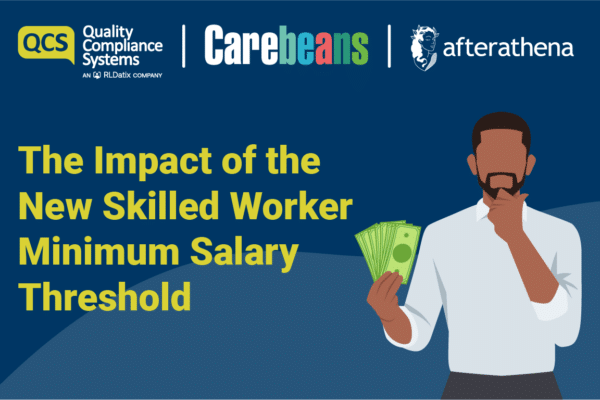Download our factsheet on ‘FAQs: HR and legal obligations for LGBTQ+ inclusion’
DOWNLOAD NOW
Alternatively, read it here:
June is Pride month, a celebration of LGBTQ+ communities across the world. Roxanne Buckley, Solicitor at Napthens answers some frequently asked questions to ensure that care providers are and embrace inclusivity in the workplace.
LGBTQ+ Pride Month is celebrated each year in the month of June to honour the 1969 Stonewall Uprising in the USA. This celebration has helped progress the LGBTQ+ movement and employers have embraced the importance of diversity and inclusion in the workplace.
Q: What HR and legal obligations should care providers consider for LGBTQ+ inclusion in the workplace?
A: From a legal perspective, the starting point will be consideration of obligations under the Equality Act 2010 (Equality Act).
The Equality Act is a piece of legislation that implements the principle of equal treatment in Great Britain; it specifically aims to protect people from all forms of discrimination in the workplace and in wider society.
The Equality Act sets out nine protected characteristics and if discrimination happens because of one or more of these characteristics it is unlawful. The nine protected characteristics are:
- Age
- Disability
- Marriage and civil partnership
- Religion or belief
- Race
- Pregnancy and maternity
- Sex
- Gender reassignment
- Sexual orientation
We all share some of these characteristics and as such the Equality Act aims to protect everyone from discrimination.
Q: Who is protected in the workplace?
A: The protection in the workplace under the Equality Act is wide. For example, it would seek to protect employees, workers, part time workers, agency staff, suppliers, customers, contractors, visitors, job applicants and this can also include former employees.
Q: Who is liable for discrimination?
A: If an employee, in the course of their employment, is found guilty of being discriminatory, they can be held personally liable. This will also extend to any agent of the employer.
It is important to remember that the employer will also be held liable if it cannot show a ‘reasonable steps’ defence i.e. the employer must be able to show that it took all ‘reasonable steps’ to prevent employees (or its agents) from committing the discriminatory act complained of or discriminatory acts in general. To evidence this it is important that all employers have in place an equality and diversity policy, which is kept up to date, circulated at intervals throughout the year and that the employer also puts in place equality and diversity training for all employees.
Are there any exceptions as to when discrimination is not unlawful?
In short yes, exceptions are contained in Schedule 9 to the Equality Act. This can include, but not limited to, an occupational requirement or the employer taking positive action to address disproportionate representation of certain classes of people who share a relevant protected characteristic.
For example, a job advertisement for a support worker at a women’s refuge requires a job applicant to be female. Given the nature of the prospective job, such requirement is likely to be considered a reasonable requirement. It will be important to remember that any action taken must be proportionate and therefore taking legal advice is always helpful to avoid the pitfalls. Whilst the following are not exceptions per say, there are a couple of quirks in the Equality Act that are noteworthy, for example:
- Section 12 of the Equality Act covers sexual orientation; it does not cover discrimination against trans persons, however, trans persons are provided with protection by virtue of Section 7 of the Equality Act which covers gender reassignment
- Section 7 of the Equality Act covers protections for those individuals undergoing gender reassignment. The protection is considered to be wide as it covers “a person who is proposing to undergo, is undergoing or has undergone a process (or part of a process) for the purpose of reassigning the person’s sex by changing physiological or other attributes of sex”
This means that an individual who is seeking protection under Section 7 need not have commenced medical intervention to reassign their gender. If a gender recognition certificate (GRC) is applied for and granted, then the person will become for all purposes a member of that acquired gender. It will be important for employers to consider the Gender Recognition Act 2004 in tandem with the Equality Act.
What are the consequences of breaching the Equality Act?
A claim could be issued for discrimination and/or other claims such as constructive unfair dismissal. On a finding of discrimination, a Tribunal could award compensation (to also include an injury to feelings award which may comprise aggravated damages). In addition, or as an alternative, a declaration as to the parties’ rights could be made and/or an appropriate recommendation.
Injury to feelings awards are usually based on Vento bands. The bands are named after a landmark case, Vento v Chief Constable of West Yorkshire Police, where the Court of Appeal set out clear guidelines for courts and Tribunals to apply when assessing injury to feelings awards. Vento bands are updated (usually increased) every 6 April in line with inflation,
- Lower band = £990 – £9,900
- Middle band = £9,900 – £29,600
- Upper band = £29,600 – £49,300
How can an employer protect themselves and/or any tips?
The best defence is one where an employer can show that it has taken preventative measures to stop discrimination from occurring in the workplace. This can be done by having robust policies in place and ensuring that equality and diversity training (and refresher training) is provided and maintained (and a log of such training is recorded).
The Equality and Human Rights Commission (EHRC) has produced a Code of Practice which provides guidance on best practice. A recommendation is that an employer has an adequate equal opportunities policy in place which includes the following:
- A statement of the employer’s commitment to equal opportunities for all employees, job applicants and workers
- Set out the employer’s expectations e.g. set out examples of what is and what is not appropriate/acceptable behaviour at work
- An outline of the rights and responsibilities of those to whom the policy applies
- Procedure for dealing with any complaints/concerns raised in respect of alleged discrimination
- How the policy applies to other policies/procedures
- Who is responsible for the policy and how it will be implemented?
- Details of monitoring/review processes
An effective policy will not only help the employer show it has taken preventative measures to avoid discrimination from taking place in the workplace, it can also help the employer springboard into a disciplinary process should this be necessary.
Employers should also consider the following…
- Implementing appropriate staff training on equal opportunities
- Being mindful of including absences as a result of transitioning for gender reassignment within absence triggers and/or adopting adjustments to such process
- Ensure employee benefit schemes are not discriminatory
- Ensure conduct of any formal processes (such as grievance investigation) do not lead to an allegation of discrimination resulting from the manner (or lack thereof) of such process
- Ensure that you are complying with obligations under GDPR and Data Protection Acts; NB: gender reassignment and details as to a person’s gender history will constitute special categories of data
– such information can only be processed for certain specified reasons. Unauthorised disclosure by a person acting in an official capacity to another person may lead to a criminal offence under
the Gender Recognition Act 2004 - Speak with external 3rd party agencies and staff in shaping and developing appropriate policies
- Consider implementing anonymised application forms in your recruitment practices
- Attending events for the LGBTQ+ community such as job fairs, Pride and charity events
If you have any queries in respect of equality and diversity and/or concerns of discrimination at work or in need of specific advice in relation to any employment law query, please contact a member of the Napthens Employment Team who are able to offer 30 minutes of free advice to QCS customers.






